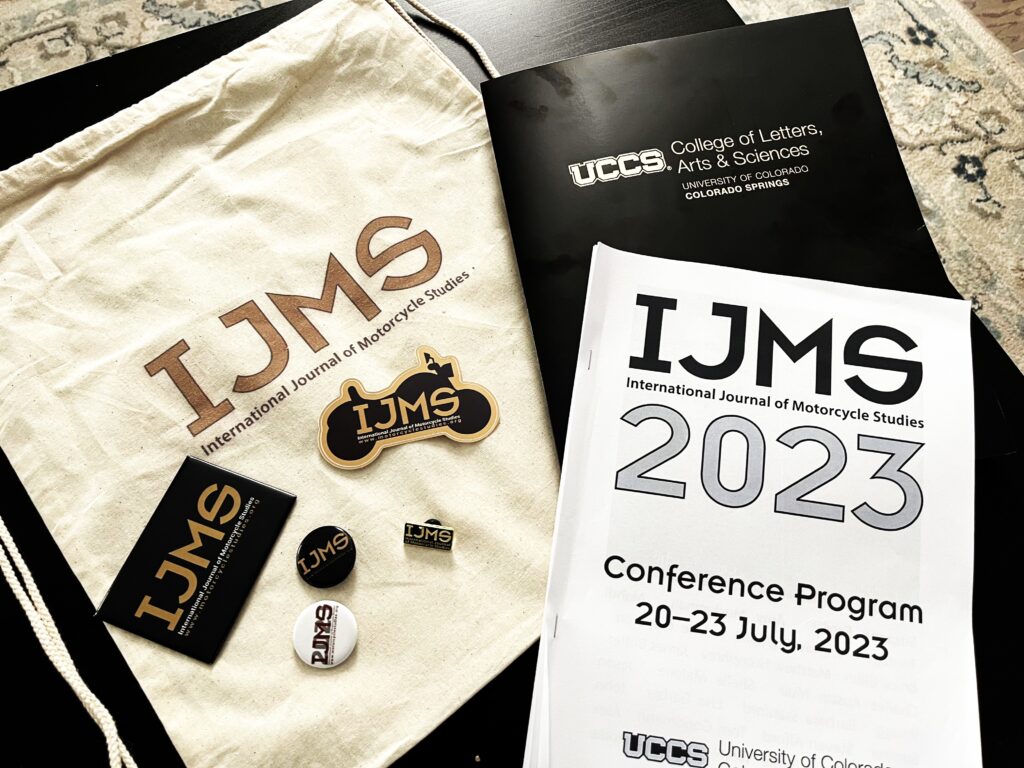In July 2023, I had the incredible opportunity to present at the 10th International Journal of Motorcycle Studies (IJMS) conference, held at the University of Colorado, Colorado Springs. This was my first time attending—and presenting at—this unique gathering of scholars, creatives, and motorcycle enthusiasts from across the UK, Canada, and the US. After a long pandemic pause, the conference returned with a vibrant energy that was impossible to miss.
The conference setting was intimate and welcoming. We gathered in a small lecture room at the university, the July heat pressing outside while inside the atmosphere buzzed with excitement and camaraderie. Attendees represented a fascinating range of disciplines—literature, film studies, history, psychology, urban planning, and beyond—all united by a shared passion for understanding the motorcycle in its many cultural and personal forms.
I was at the tail end of my PhD journey, presenting my project Myths, Maps and Motorcycles as part of the Auto-Moto-Ethnography panel. My research explores the lived experience of adventure motorcycling, focusing on a 32-day ride through Iceland on a Yamaha Ténéré 700. What makes my study a bit different is how I use comics—not just to illustrate but as a core part of my research method and analysis. Creating comics allowed me to capture the spatial, sensory, and emotional layers of adventure riding in ways that traditional academic writing sometimes struggles to convey.
Presenting this work was both exciting and nerve-wracking. Sharing personal stories and visuals in front of peers can feel exposing, but the response I received was encouraging and insightful. The discussion afterwards helped me clarify some of my ideas and gave me valuable feedback as I prepare to submit my thesis within the next year.
What struck me most about the IJMS conference was the sense of community and the openness with which people approached such diverse topics. Keynotes and presentations ranged from literary analyses and film studies to psychology and urban transport policy. Yet, whether discussing Lou Reed and Honda Fireblades or throttle therapy and PTSD, everyone seemed to agree that motorcycles are much more than machines—they are vessels of identity, culture, and human experience.
One memorable moment was the keynote speaker’s ride-by on her Harley-Davidson, effortlessly weaving through the lecture hall on one wheel—a perfect metaphor for the conference itself: a thrilling blend of performance, passion, and scholarship.
During breaks, the chatter often drifted to shared stories of rides, favorite routes, or the quirks of motorcycle culture. Visits to the nearby Rocky Mountain Motorcycle Museum added another layer of appreciation, connecting academic insights with tangible history.
Looking back, the conference was not just an academic checkpoint but also a reminder of why I embarked on this research journey in the first place. It reinforced the value of blending personal narrative with rigorous analysis and showed me how innovative methods—like comics—can open new doors for understanding complex experiences.
I left Colorado inspired and motivated, already anticipating future conversations and collaborations in this vibrant community. For anyone interested in the many ways motorcycles intersect with culture, identity, and adventure, the IJMS conference is a remarkable place to connect, learn, and ride alongside kindred spirits.


